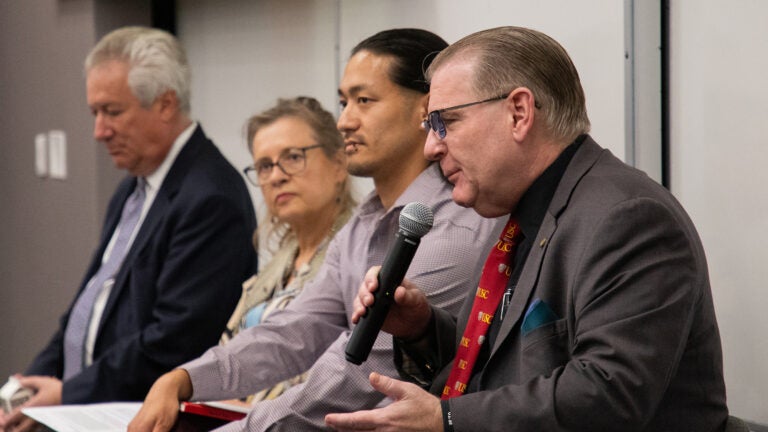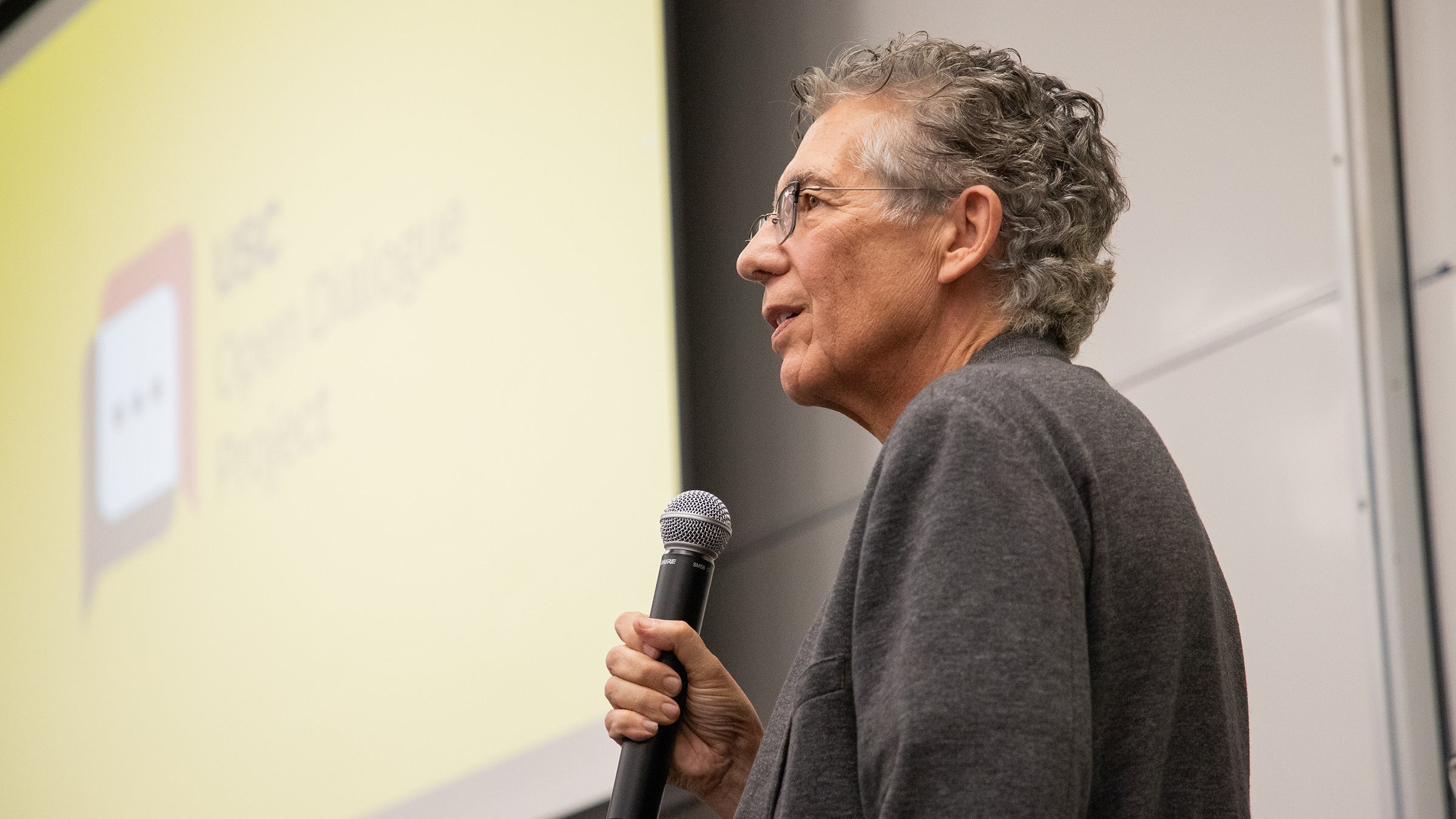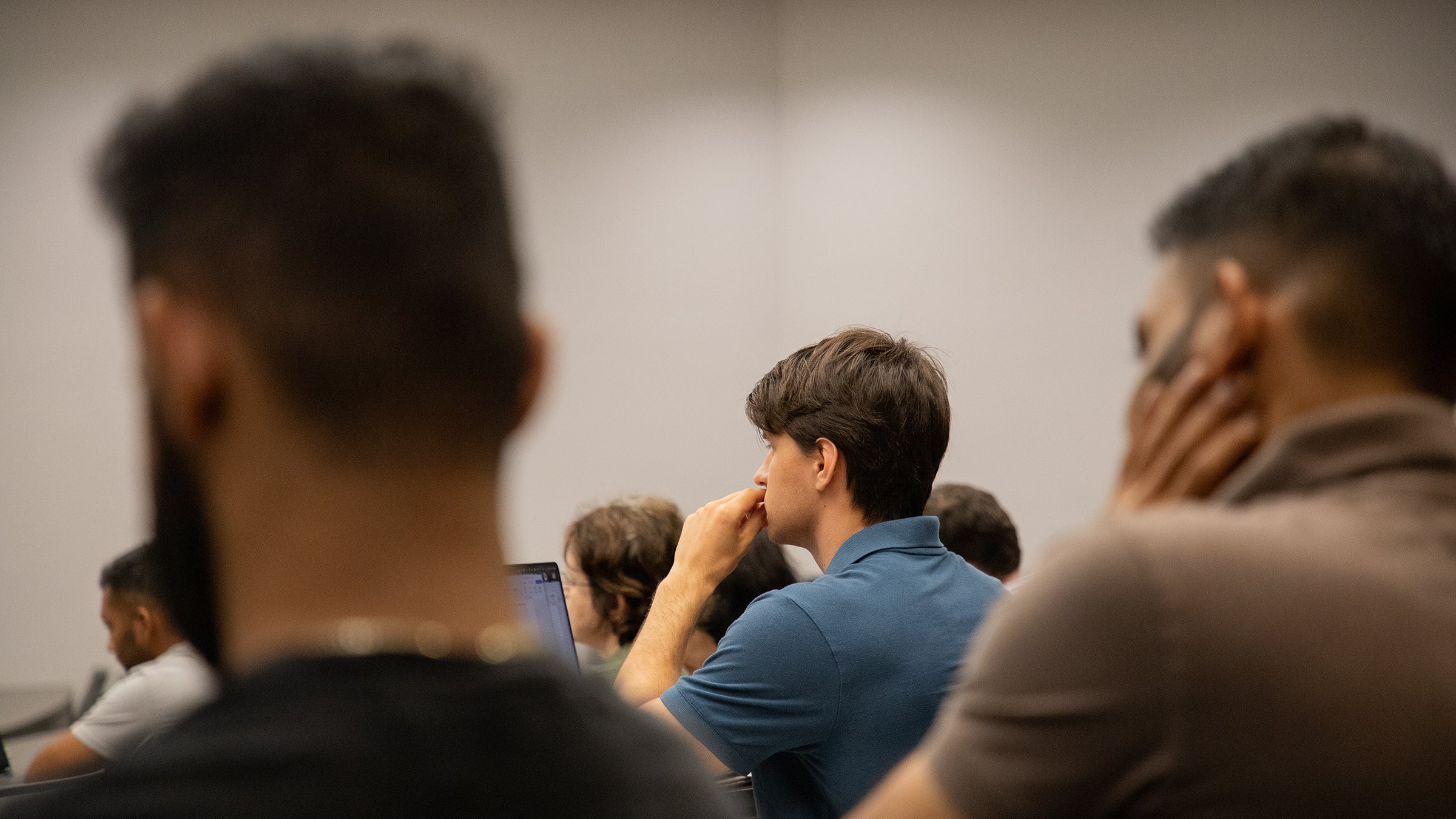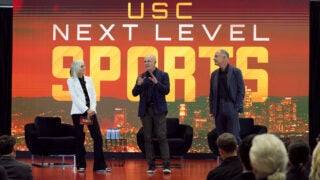
Panelists Richard Green, Anna Krylov and Ryo Sanabria (from left) listen as James Moore speaks at Friday’s Open Dialogue Project kickoff event. (Photo/Sydney Salinger)
Inaugural USC Open Dialogue Project event fosters a vibrant exchange of ideas
The faculty panel discussion focused on next steps USC can take to address issues raised by the Compact for Academic Excellence in Higher Education.
At the inaugural event of the USC Open Dialogue Project, the project’s founding director, Neeraj Sood, set the stage for a lively discussion among four USC faculty members across the ideological spectrum about issues facing higher education.
“I have three expectations,” said Sood, a professor at the USC Price School of Public Policy. “Let go of winning. … Be curious and open-minded. … Focus on the ideas, and not the people.”
By inviting respectful disagreement, Sood helped ensure that the conversation — held Friday in the Musick Law Building on the University Park Campus and livestreamed to an audience of about 225 faculty, students and staff — advanced the Open Dialogue Project’s goals. Launched earlier this month by USC Interim President Beong-Soo Kim, the project is a universitywide effort to strengthen core values that define the university: academic freedom, free expression and open discourse.

The discussion focused on faculty opinions about the next steps USC should take to address issues raised by the Trump administration’s Compact for Academic Excellence in Higher Education. While USC declined to participate in the compact, Kim noted that many of its proposals — including fostering a multiplicity of viewpoints on campus — merit a national conversation which USC is eager to join.
Moderated by Robert Rasmussen, the J. Thomas McCarthy Trustee Chair in Law and Political Science at the USC Gould School of Law, the faculty panel included Richard Green, professor, director and chair of the USC Lusk Center for Real Estate, and chair of the Wilbur H. Smith III Department of Real Estate Development at USC Price; Anna Krylov, USC Associates Chair in Natural Sciences and professor of chemistry at the USC Dornsife College of Letters, Arts and Sciences; James Moore, professor emeritus of industrial and systems engineering at the USC Viterbi School of Engineering; and Ryo Sanabria, assistant professor at the USC Leonard Davis School of Gerontology.
Open Dialogue Project: ‘Dialogue is about engaging’
“I love the name ‘Open Dialogue,’” Rasmussen said of the project. “Free speech is about talking, whereas dialogue is about engaging.”
Rasmussen solicited the panelists’ reactions to the compact and their ideas on steps USC can take to enact necessary reforms, maintain a vibrant marketplace of ideas and promote free expression in classrooms and other campus forums. While their perspectives on the compact and the path forward differed widely, the panelists found common ground in their desire for greater tolerance of opposing or unpopular viewpoints.

“I think we should be allowed to say, ‘I think you’re wrong, and here’s why I think you’re wrong,’” Green said. “On the other hand, I think there is no place for ridiculing people. There’s a difference between saying ‘I think you’re wrong’ and ‘I think you’re stupid.’”
“We can coexist and disagree on essentially everything, as long as we are not hurting each other or oppressing each other in any way,” Sanabria concurred. “The purpose of this open discussion is to acknowledge that there are other ideas that we don’t agree with — and accept that that’s OK.”
Several of the panelists touched on the importance of bolstering academic freedom, which allows faculty to teach, research and discuss controversial issues without fear of reprisal or retaliation. Moore pointed out that tenure-track professors, who have permanent employment, are more likely to feel safe speaking their minds than non-tenure-track professors hired on contract. He recommended that USC “focus more on hiring tenure-track [faculty] who are afforded the protections of tenure to ensure that they do have academic freedom.”
Krylov spoke about the need to balance academic freedom with having an array of viewpoints within academic units. “We should let [faculty] develop courses the way they see fit,” she said. “But if an entire program offers courses only from one perspective, that’s not OK. As USC, I think we should take a concerted effort to make sure that our teaching, our course offerings … present the necessary breadth.”
Sood appreciated that the panelists expressed divergent opinions without arguments or personal attacks. “I think that makes us a better kind of community,” he said.



